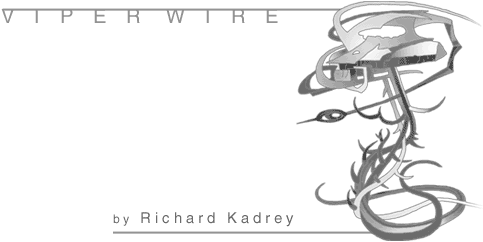05.01.02

|
| |
Heat Island Even the rats were gone. There was nothing to eat, nothing left to scavenge. Why should they stay? The great east coast fault line, miles beneath Manhattan, had shifted dramatically for the fist time in millions of years. A slip of ten feet had wiped out many of the cities of the northeast, and had leveled Manhattan. Barnett was going to rebuild the city. His team had laid out the array of nanoassemblers all around the island, sixty-four sets in all. This was Barnett's favorite moment on any project--the hush before the storm, before the assemblers began consuming everything in the area, rearranging their molecules and creating something new. Barnett's nanomachines would eat rubble and shit out a city. It was a wondrous thing, and right now, before he hit the switch to begin the process, it was a perfect moment, ripe with hope, beauty and possibility. Of course, Barnett knew the reality of cities. When the people returned to Manhattan, things would be the same as they always had been. The litter. The noise. The stink of drunks pissing in doorways. The loneliness of the place, most of all. Helena didn't love him. She never would. Barnett was over the initial devastation and had entered a kind of slowly throbbing blankness. He wasn't angry with her. He couldn't be. He loved her. And he was well aware of his long history of bad decisions where love was concerned. Moments missed. Possibilities lost. Opportunities squandered. Helena would never love him, but Barnett would still have her. The certainty of it thrilled him as he'd dismissed his crew to make the final equipment inspections on his own. The feeling was with him now as he stood at south end of the island in Battery Park, looking out into the harbor. Barnett's radio crackled. Someone was asking when he was leaving the island. Barnett turned off the noise. He was utterly alone. Then he pulled the remote from his jacket and pressed the button. A buzzing filled the air. One minute later, a billion billion nanobots erupted from the assemblers around the island, like swarms off locusts, and began to eat the remains of the city. Helena had lodged herself, like a perfumed blade, in his heart. Barnett would never let her out, and he'd make sure she'd never want to leave him. The nanobots settled on his skin, systematically dismantling his flesh and bones, rearranging Barnett's molecules into pavement, street lights, sewage tunnels, electrical conduits, elevator shafts, the glass skin slowly wrapping itself around new-born skyscrapers, the stone wall circumscribing the resurrected Central Park. Barnett knew he'd mangled his life and could never rebuild it to his satisfaction. But he could build a city, a perfect place, a home where families would live and children would play, business would flourish, art would thrive and life would begin again. And when Helena walked down his streets and slept within walls made from his blood and muscles, she would love him. The last part of Barnett that the nanobots took was his face. His smile vanished into the air, like the Cheshire Cat's.
Richard Kadrey is a member of a small group of innovative writers, including William Gibson, Bruce Sterling, John Shirley, Pat Cadigan, Tom Maddox, and others, who changed the face of science fiction in the 1980s. He also creates art. He lives in San Francisco. |
home | stories | columns | archive | faq |
The Infinite Matrix is sponsored by
Matrix.Net,
the
Internet's oldest and most experienced
independent performance analysts.
Stories and articles © copyright 2001, 2002 by the original authors.
Illlustrations © copyright 2001, 2002, Jay Kinney & Paul Mavrides.
Site graphics, logo, and html coding © copyright 2001, Matrix.Net.
All other material © copyright 2001, 2002, Eileen K. Gunn.
All rights reserved.